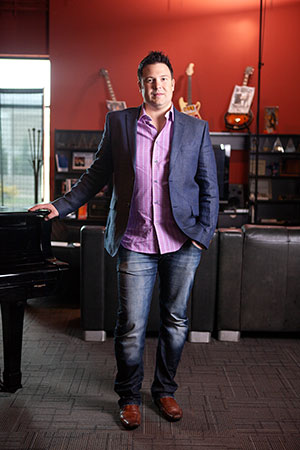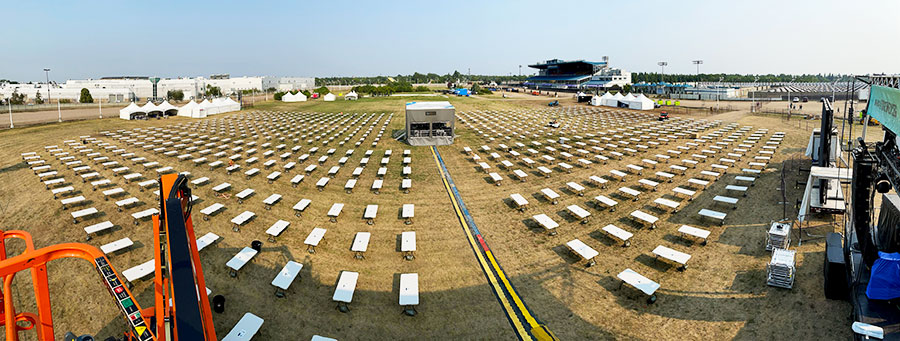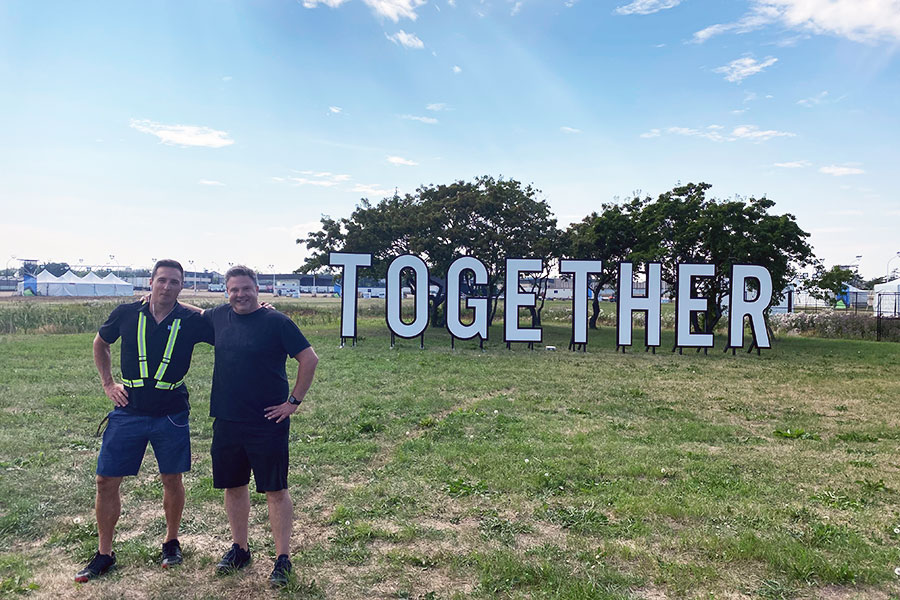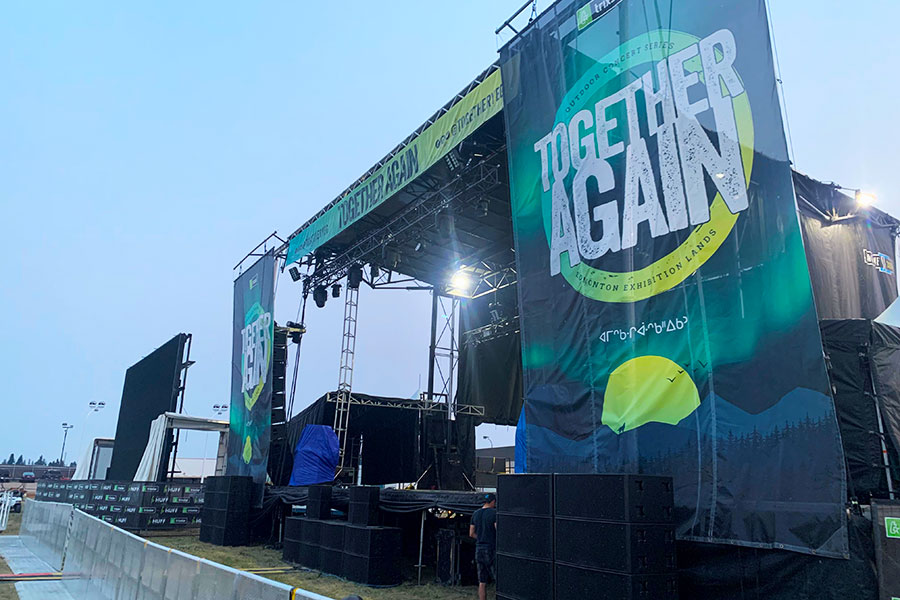“Together Again” marks a new era in live events
To be frank, it's amazing that Mike Anderson’s company survived the pandemic. Trixstar, which the NAIT grad (Marketing ’98, Management ’99) established in 2005, is an entertainment company that gathers crowds for live events as often as 300 times a year (in the old days, at least) – festivals, concerts, and more.
But on April 23, 2020, its business model was effectively outlawed, as Alberta chief medical officer of health Dr. Deena Hinshaw announced the restriction of gatherings larger than 15 people. It would not be until more than a year later, on July 1, 2021, that unrestricted events could be held once again.
Trixstar’s resilience is the product of not just doggedness, but an ingenuity that will have a lasting impact on the event planning industry and the shape of concerts to come.
On April 23, 2020, its business model was effectively outlawed.
Anderson and his staff of six full-timers (none were laid off, thanks to “a strong cash position” going into the pandemic, efficiency once lockdowns started and government support) spent their downtime optimistically productive, planning ways to have fun in the midst of a potentially devastating virus. They examined what they could change for the better, and even turned their conclusions into free resources and white papers to help strengthen the industry as a whole.
More importantly to fans of live music and other events, Trixstar put those ideas into practice. In June 2021, Anderson and his team announced Together Again. Billed as Canada’s first socially distanced concert series, it will bring dozens of genre-spanning acts to Edmonton between Aug. 6 and Sept. 5. Trixstar also added the Great Outdoors Comedy Festival – featuring the likes of David Spade and Chelsea Handler – to the mix, following a similar format.
It’s the party Anderson promised to throw – “six feet apart, of course” – when we talked to him last May. In the weeks before launch, Anderson told us how it came about, what it may mean to the future of live events, and how the last year-and-a-half reshaped his perception of what health really means.
Curing the common concert
As soon as the Trixstar team finished cancelling events at the end of April 2020, they went into planning mode, recalls Anderson, and addressed the big question: “What do events look like during COVID and after COVID?”
 They examined every touch point, he says, from the point of arrival, getting food and beverages, merchandise, visiting bathrooms, avoiding other people, and so on.
They examined every touch point, he says, from the point of arrival, getting food and beverages, merchandise, visiting bathrooms, avoiding other people, and so on.
“We had the benefit of time,” Anderson adds, somewhat wryly. “I think we constructed 14 versions of our plan before the one you see before us.”
Rock and roll and COVID
One of the biggest challenges was how to separate people at events that traditionally have them shoulder to shoulder.
“We came up with the concept of table seating, reserved for your group of two, four or six people,” says Anderson. “You're not going to have any strangers at your table. That’s your table.” But there was a snag.
“We couldn't get the right size of tables. You couldn’t rent them anywhere. So we bought them at Costco – 1,400 tables. I believe there's a table shortage now.”
“I can see future festivals having VIP seating areas with your own table.”
Attendees scan a barcode on their table that takes them to a menu on their phones to order drinks, food, band T-shirts, whatever. All of it arrives a few minutes later.
“I can see future festivals having VIP seating areas with your own table,” says Anderson. “If you want to get away from the crowds, you can just go into this upgraded experience.”
A gateway to “normal”

“Obviously, there's a lot of people who are still uncomfortable with the idea [of large events]: we're shut down, shut down, shut down, and, OK, we're wide open,” says Anderson.
Early responses to Together Again, almost ironically, indicated that people were grateful for the opportunity to keep apart. The event, which will accommodate a couple thousand people at each show, is being held at the Racetrack Infield on the Edmonton Exhibition Lands (the old Northlands grounds), a space bigger than Commonwealth Stadium.
“I think it will be a great gateway event. Eventually, Rogers Place will open up, Commonwealth Stadium will open up, and there will be tens of thousands of people [there], where this is a way for people to start engaging with society again.”
Let the healing begin
Together Again is a way for Trixstar to start re-engaging its community again as well. Generating long overdue revenue is only part of that (Anderson assures us that, despite the precautions and decreased capacity, the company is positioned to make a profit on the event). In Anderson’s mind, there are equally important outcomes of rebuilding the relationship.
We’re going to be bringing 700 people back to work in something that they absolutely love to do.
“There's been an industry shut down for 15 months: the stage technicians, the video people, the lighting technicians, the people who build the tents, the bartenders, the security guards, the parking attendants, the artists. We’re going to be bringing 700 people back to work in something that they absolutely love to do. To me, that's a really special thing.”
What’s more, two dollars from every ticket sold will go to Boyle Street Community Services and Hope Mission, Edmonton nonprofits dedicated to helping the city’s less fortunate.
A new view on health

There’s no question that the shutdown changed Anderson’s views on more than his industry. It helped him realize that our views on health need to change, too. Throwing the biggest party since March 2020 is one way to cheer people up, but it’s not enough. Anderson strives to keep a positive outlook, but the pandemic tested that.
“There were some tough times and being able to access a psychologist help[ed] me with the tools to deal with some of the emotions,” he says. Though he feels the stigma around asking for help is lifting, he worries that not enough people have access to that help, and are being left to deal with their feelings alone.
“How can I do my part to bring attention to that?” Anderson asks. The pandemic has shone a stark light on the need for people to be together, but also on the need for support when they can’t.
“If we're all healthy, and our minds are healthy, I think the world's going to be a better place.”
